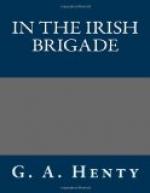In the evening, however, after partaking of supper, Desmond, without being asked, related the incidents, so far as he knew them, of the battle of Oudenarde, and of the manner in which he received his wound.
“The whole disaster was due entirely to the Duke of Burgundy, or rather to the king, who placed him in command over two generals of the highest skill and reputation. If he had wanted to accompany the army, Burgundy should have done so just as our King James did, merely as a volunteer.
“I am told that the king showed great courage in the battle. For my part, I think his presence was altogether a mistake. He claims that the English are his subjects, and yet he takes part with a foreign army in battle against them. His being present will certainly not add to his popularity in England.”
“I agree with you,” de la Vallee said. “It would have been much wiser for him to have abstained, altogether, from interference in the matter. It was, of course, a different thing when he attempted to land in Scotland. Then he would have been leading the loyal portion of his subjects, against those whom he considers rebels against his authority. That was quite a different thing from acting, without cause or reason, as a volunteer in the French army, against those whom he regards as his countrymen and subjects.
“I am afraid, Desmond, that, though it may shock you to think so, these Stuart princes of yours are not wise men. Legitimate monarchs of England though they may be, they do not possess the qualities that endear kings to their people. From what I have heard, James was a heavy pedant, a rank coward, essentially not a man to be popular among a spirited people. Charles had a noble presence and many fine qualities. But, although his ideas of kingly power would have suited us well enough in France, his arbitrary measures alienated a large proportion of his people, and brought ruin upon him.
“Your second Charles, in spite of his numerous indiscretions, was not unpopular, because the people were wearied of the stern repression of Puritan rule, and were therefore disposed to look leniently upon his frailties, while they appreciated his good temper and wit. His fatal mistake was allying himself so closely with us—a grievous mistake, indeed, when we remember that for centuries the two nations had been bitterly opposed to each other. As for his brother, he forfeited his throne by his leanings towards the Catholic Church, in whose communion he died. Decidedly, the Stuart kings were not a success.
“As to James the Third, as you call him, I know nothing beyond the fact that he is a protege of the king of France, and has now fought against his own people—a blunder, as it seems to me, of the worst kind, and one which is certain to alienate many of his supporters on the other side of the water. Were he to mount the throne, it would be partly due to the aid of French troops and French money—men and money, mind you, of a power at war with England! He would therefore, necessarily, like Charles the Second, be regarded as a protege of France. He would be bound in gratitude to Louis, and the position of England would be altogether changed. She would become the ally of Spain and France, her ancient enemies; and opponent of her present allies, Holland, Austria, Protestant Germany, and Denmark.”




